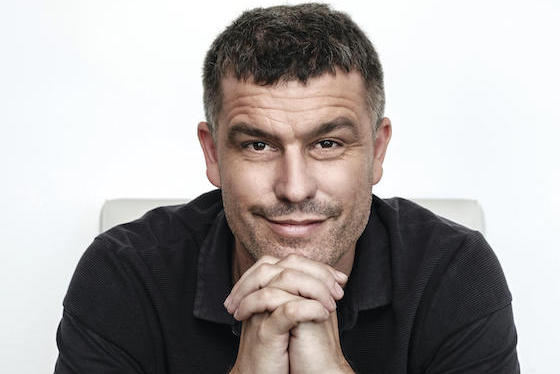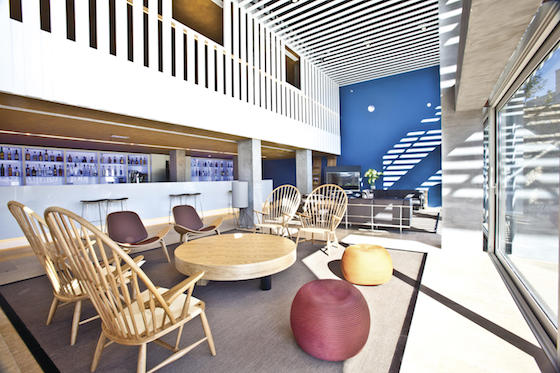Launching a hotel enterprise at any time is risky. Launching one in a global recession is an even greater gamble.
For Marc Rahola, founder and CEO of Ibiza, Spain-based OD Group, it was one key to success. “Crisis is always a change moment,” says Rahola, who started the lifestyle hotel company in 2009, and the disruption offers an “opportunity to make something happen in another way.”

That’s what Rahola and his team are striving to do with their hotels, which include three in Ibiza, one in Barcelona and one in Mallorca. In 2019, OD Côte d’Azur on the French Riviera will open. Plans are underway for 2020 openings in Madrid and Miami.
Contributed by Karen Kroll
One of the pillars underpinning OD Hotels’ approach to hospitality is excellent location, often near top restaurants, shops and museums. “The city is the experience,” says Rahola, who believes that the hospitality industry is suffering from an “Airbnb effect.” High costs have prompted travelers to look for alternatives to traditional hotels and book shorter stays. When they do travel, “they want to be in the center of the experience,” which is where the company puts its hotels – OD Barcelona in the L’Eixample District is a short walk to Passeig de Gràcia and its Catalan Modernist architecture, as well as upscale shopping.
Rahola and his team strive to bring some of the aesthetic of each location within the hotels – what he calls “having the flavor of the city.” OD Ocean Drive in Ibiza, the island that originated electronic music, often hosts high-profile DJs.
The renovation of abandoned buildings is another pillar of OD Group’s philosophy, opening up a greater number of properties in a range of locations and adding to the story of the hotel. The 15-room Ibiza Can Jeune originally was an island manor house. An abandoned cinema, closed for 20 years, will be renovated for OD’s Madrid hotel.

Jumping the ocean
Plans call for the 165-room OD Miami to be the largest of the hotels, but there is work ahead to tell its story: It will be housed in Commonwealth Building, originally built in 1926 with 17 stories. It was destroyed in a hurricane several years later. Only seven levels were rebuilt, Rahola says. OD Group plans to rebuild all 17 levels. “For a Spanish company, the biggest effort would be Miami. It’s an expensive market to get in, and a very competitive one,” says Ivar Yuste, partner at PHG Hotels & Resorts, a hotel consultancy in Madrid.
Cosmopolitan character, another foundation of Rahola’s strategy, reflects the hotels’ clientele, only 20% of whom come from within Spain. The hotels’ restaurants meld Asian, Latin American and European influences.
By launching OD Group during the recession, Rahola took advantage of “a distressed situation in terms of assets,” he says. “In this situation you’ve got the possibility to choose assets that make sense for your idea and to create a portfolio.” The Ocean Drive building started life in 1969 as a one-star hotel. OD Group acquired it and renovated it to fit its boutique concept. On the other hand, lining up investors, never easy, becomes even more challenging in a financial crisis. “You have to convince investors and other people (to invest) while they were having a hard situation,” Rahola says. One key is developing properties that make sense.
“The main challenge when you expand simultaneously into several markets is to make sure you gain critical mass fast enough in those markets. In each of these new destinations you need to set up a commercial structure which is only sustainable if you have multiple properties,” Yuste says. “They need to feed their pipeline and deploy new properties.”
OD Group’s financial structure is one of the more sophisticated when compared to many hotel companies within Spain, Yuste says. “In Spain, leisure companies typically grow with their own equity,” he says. Rahola is “more creative financially.”
The company still owns its portfolio of hotels, but in order to expand it launched its own private-equity fund, which allowed the company to develop five projects, including Miami. Investors are family offices and international funds.
Within the OD Group holding company, Rahola holds the majority of shares in OD Hotels. He is developing his own private equity fund to fund future growth, including in the hotels France and the U.S. As the acquisition market in Spain has heated up, it’s boosted prices of potential properties. That’s one reason, along with a desire to diversify, that OD is looking outside the country, Rahola says.
Among the challenges confronting OD Group, the riskiest is feeling comfortable, Rahola says. The feeling that “I have nothing to learn or to prove, that scares me,” he says. “I want to be learning all the time and always looking for new goals.”
